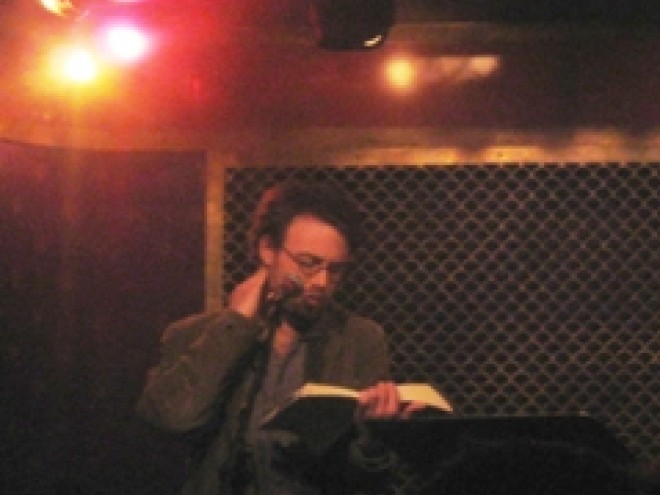These four “messages” all ponder the relation between art and life. The first has a familiar outline: a nondescript protagonist gets involved with questionable characters, his mistakes multiply, and his situation grows more dangerous and more desperate. In “Emission” the danger comes from blog posts rather than ransom notes, and the plot hinges on electronic traces rather than handwriting analysis, but otherwise it is faithful to the conventions of its genre. We are left wondering how long a not-so-innocent man can continue to flee the consequences of his decisions.
“McDonald’s” takes the form of a self-referential, Beckett-like interior monologue. A frustrated writer relates a pulp-fiction story idea to his notional father while driving down a highway, then switches to explaining the details to his unseen mother, and ends up contemplating a certain ubiquitous fast-food restaurant whose name he can’t bring himself to utter. The narrator takes an idiot-savant pleasure in obscure words — dromomaniacal, drapetomania, mogigraphia — perhaps as compensation for being unable to create anything more consequential than the pharmaceutical warning notices he writes at work. His imagination is as ineffectual as his existence.
A fish out of water, a Jewish writer from New York teaching in the hinterlands, condescends equally to mid-America and to bad writing in “The College Borough.” He decides to create a bit of Manhattan in his college town, and instead of stories he assigns his students to build a functional, full-scale replica of the Flatiron building on a campus playing field. It becomes his ultimate triumph, a greater achievement for him and his students than their words could ever be.
“Sent” begins like a folktale: a woodsman builds a bed in an unnamed country that is Russia a century ago. In our time the bed is used in a pornographic video, which begins the real story, a quest by an American man to find a porn star named Tonya he is obsessed with. When he travels to Russia to find her, he gradually loses his tenuous grasp on reality.
Joshua Cohen is not only a gifted novelist but also an astute critic with an immense knowledge of world literature. These thought-provoking stories reflect his deep awareness of the mechanisms of fiction as well as his thorough engagement with the textures of contemporary life.
Read Joshua Cohen’s Posts for the Visiting Scribe
Promowork: A Necessary EvilIn its review of Four New Messages the New York Times said of Joshua Cohen, “he’ll make you want to be an angel investor in his stuff. What’s a book but a public offering? You’ll want to be in on the ground floor.” Jewish Book World’s Bob Goldfarb asked him about his work.
Bob Goldfarb: You’ve been compared to David Foster Wallace and Thomas Pynchon. Can a contemporary writer avoid the anxiety of influence?
Joshua Cohen: Pynchon I thought a lot about in my late-ish teens; Wallace, though, never gave me “the howling fantods” — I was too young (b. 1980) to know to cheer the ’90s revolt against literary blankness and, by the time I began reading him, in the early oughts, I was living in Europe and more susceptible to that education. Wallace was always much too direct, too straight, for me (the concerns, not the style). He never talked out of the side of his mouth. His irony was not mine — was too goyisher, to put it bluntly. … No one has ever evaded influence, or anxiety — in or out of books.
BG: Is that harder for a writer who is also a critic?
JC: Criticism just pays the bills, but fiction remains indebted – to both fiction AND criticism.
BG: You sometimes write in a very vernacular voice. How much of that is ventriloquism or social critique or satire, and how much is it an extension of your own personality?
JC: Why can’t my own personality be one of ventriloquism/social critique? The more voices I write, the less I’m sure I exist at all.
BG: You also deploy an enormous vocabulary with lots of words never heard in conversation. How do you picture your readers reacting to them?
JC: I don’t consider a reader’s reaction to anything — I consider my own. When I encounter an unfamiliar word, I follow the advice of Reb Spiegel, fifth grade, Hebrew Academy of Atlantic County: “Dick. Shun. Airy” (the class loved that gag, he loved that the class loved it). I might point out that dickshunairies are more available, and more useful, than they were in 1990.
BG: Your writing is sometimes called “post-modern” or “experimental.” Is that meaningful? Is it accurate?
JC: To me, postmodernity can only mean an awareness of the antiquity of the techniques of the art called Modernist (which, the periodicals remind me, has earned a capital letter). As for experimental—ridiculous. My books test nothing. I have no hypothesis and, certainly, no conclusion. The term, if only for purification’s sake, would be better applied to the shallow mainstream. The experiments might be the following: How many coming-of-age, or parent-dying-of-cancer, memoirs can be written? How many times can readers be expected to step into the same stream twice?
BG: Four New Messages sounds dystopian much of the time. Are you writing about a fictive world, reporting what you see around you, or sending a message?
JC: I’m sending a message that says: 1) this is what surrounds me, 2) this is fiction, 3) I have no message, and 4) (the curtain line of the book) my message has been sent.
BG: You write very convincingly about marginal, off-kilter people. Do you have any interest in characters who are successful in conventional ways like having money, status, and power?
JC: I have interest in all people and all characters. I’m not sure I subscribe to your conventions. I, for example, have no money but, to some people, some status and some power. I know — I am related to — people who have some money but limited status and limited power. I think what you’re talking about is something like what keeps wires working—insulation. I am most interested in people and characters who are, more or less, psychologically uninsulated—frayed, the copper all askew. Richard Monomian, the anonymous narrator of “McDonald’s,” the polyonymous narrator of “Sent,” Maury Greener of “The College Borough” — they can’t help but contribute to the static.
BG: Writing can be a kind of imitatio Dei, creating something from nothing. By extension, does the act of creation impose any moral responsibility on an author?
JC: I believe it does — a moral or ethical responsibility not to readers or characters or plots but to myself as author (authors are the true heroes of their books). This responsibility — to assert that I am the writer of this book, that thou shalt have no other writers or books before me or this, that thou shalt not confuse the graven fiction with grave reality or grave reality with graven fiction, that I retain all copyright, along with the right to work six days and rest the seventh or to work only on the seventh and stay drunk smoking in bed for six, etc. — IS my responsibility to readers, characters, plots. I learned this not from Deuteronomy but from Henry James, Nabokov.
BG: You’re in the middle of a book tour. Do your audiences ever surprise you, either by who they are or what they ask you about?
JC: By who they are? No. I’m big with the oxygen tank/nasal cannula set. Jews. Women. The two demographics that still buy books (read: read). By what they ask? Occasionally. At the 92nd Street Y, after an event with Adam Kirsch and Ruth Franklin, a man approached — oxygen tank/nasal cannula — to ask, “are you the type of young writer always living in Brooklyn nowadays?” I told him, “I live in Manhattan.” Not always but nowadays. He said, “I haven’t spent an hour in Brooklyn since 1976.” As he turned to leave I asked, “you haven’t been to the airport?” He said, over his shoulder, “JFK’s in Queens.”
BG: Much of your other work is overtly Jewish in a way these stories are not, touching on Jews and European culture in Cadenza for the Schneidermann Violin Concerto, Israelis and Palestinians in A Heaven of Others, and mostly recently Witz. What would you recommend to a Jewish reader who doesn’t yet know your work?
JC: A Heaven of Others is the shortest, most transparent. I’m glad — traumatized — its politics haven’t aged. Cadenza is, forgive me, the funniest. It’s also my New York book, and I wish it had more readers here at home. Witz—there’s not much to say (that the book itself doesn’t say). I would be flattered if it were still read in a decade. But the best edification of that book would be a body of criticism tugged from its rib or, finally, the eschaton.
But I guess what I’d recommend to a Jewish reader who hasn’t yet read me is the will, or wills, of Menachem Mendel Schneerson, the seventh and last Lubavitcher Rebbe: http://mentalblog.com/2005/02/wills-of-lubavitcher-rebbe-menachem.html
Book Trailer
Additional Titles by Joshua Cohen
Bob Goldfarb is President Emeritus of Jewish Creativity International.





